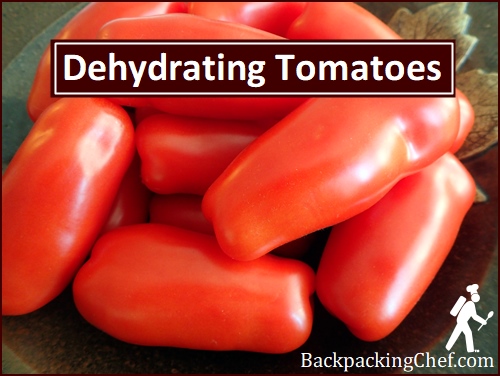Dehydrating
Tomatoes: 7 Ways to Slice, Dice & Season
This Guide to Dehydrating Tomatoes covers how to prepare tomatoes for drying, and continues with how to make tomato sauce leather and tomato powder.
It shows how to dehydrate raw tomatoes, from cherry tomatoes up to larger San Marzano tomatoes, how to dehydrate tomatoes cooked with herbs, and how to dry diced tomatoes as part of a spicy salsa.
Photo: Meaty San Marzano tomatoes are perfect for dehydrating tomatoes halved, sliced, or diced.
What
can you do with dehydrated tomatoes? Dried tomatoes add nutrition, flavor, and
color to any backpacking meal. I’ll
link to recipes that use dehydrated tomatoes at the bottom of the page.
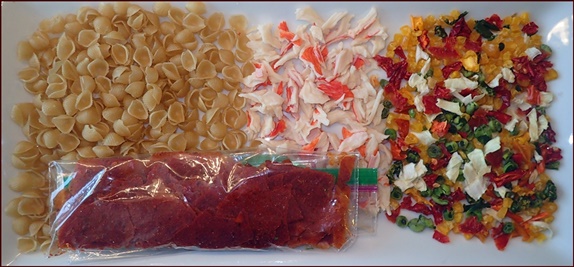
Photo: Seafood Marinara recipe includes dried tomatoes as part of the vegetable mix, plus tomato sauce leather.
I like dehydrating tomatoes in diced or chunky pieces for meals, and sliced for snacking on, especially when lightly seasoned.
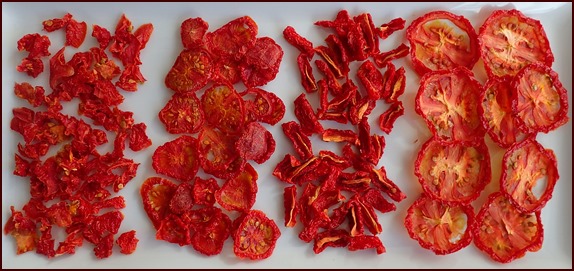
Photo: Dehydrated tomatoes: diced plum, sliced cherry, quartered cherry, and sliced plum.
Guide to Dehydrating Tomatoes
Table of Contents
Dehydrating Sliced Plum Tomatoes
Dehydrating San Marzano Tomato Halves
Dehydrating Quartered Cherry Tomatoes
Dehydrating Sliced Cherry Tomatoes
Dehydrating Cooked Cherry Tomatoes
Dehydrating Diced Tomatoes
Plum tomatoes are ideal for dicing and slicing because they are meaty with fewer seeds than big round tomatoes, and they don’t lose as much juice when you cut them.
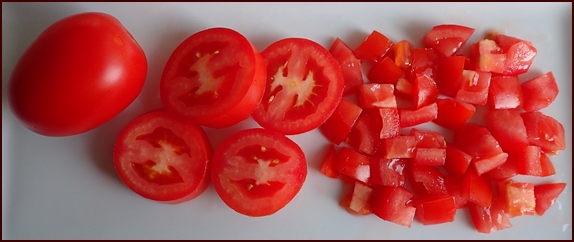
Photo: How to dice a plum tomato for dehydrating.
Cut
1. Cut off the end where the tomato was attached to the stem.
2. Cut tomatoes crosswise into ½-inch slices.
3. Cut each slice into three equal parts, then turn 90° and cut again so you end up with approximately ½-inch pieces.
Dehydrate
4. Arrange diced tomatoes in a single layer on silicone mesh dehydrator sheets. If you don’t have silicone mesh sheets, use solid nonstick sheets. Dehydrating tomatoes on mesh sheets is faster than on solid nonstick sheets because of better air circulation around the tomatoes.
5. Dehydrate tomatoes at 135°F (57°C) for 12+ hours. Dried tomatoes will be pliable with no moisture appearing when you cut a piece in half.
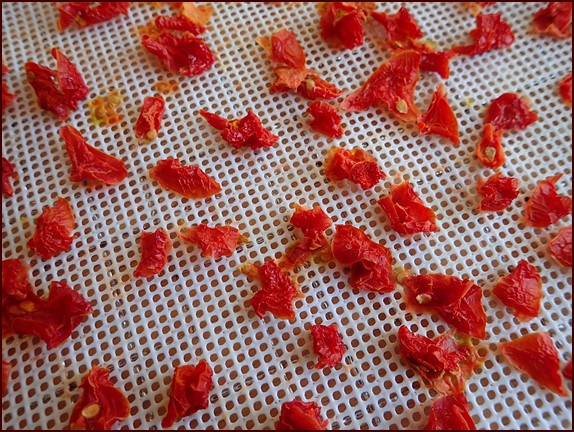
Photo: Diced tomatoes after dehydrating. They shrink a lot.
Yield: 3 cups of diced tomatoes (475 g) dehydrated on one Cosori dehydrator tray yields ½-cup of dried tomatoes weighing 24 grams.
Dehydrating Sliced Plum Tomatoes
With their meaty flesh, plum tomatoes are great for slicing. I slice them thin, so they dry almost crunchy, like tomato chips. Hit the slices with a few shakes of seasoning salt on both sides before drying them.
My favorite seasoning salt with herbs is A. Vogel Herbamare. (Amazon)
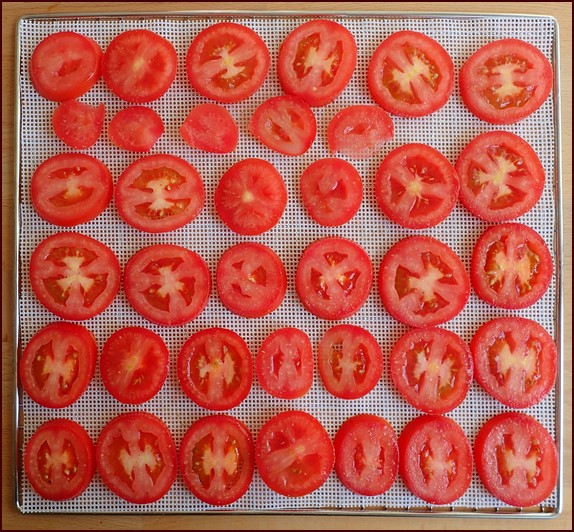
Cut
1. Cut off the end where the tomato was attached to the stem.
2. Cut tomatoes crosswise into ¼-inch slices.
Dehydrate
3. Arrange tomato slices in a single layer on silicone mesh dehydrator sheets.
4. Shake a little seasoning salt on both sides of the tomato slices.
5. Dehydrate tomatoes at 135°F (57°C) for 12+ hours. Thinly sliced tomatoes will be almost crispy when dry. They will crack slightly when you bend them.
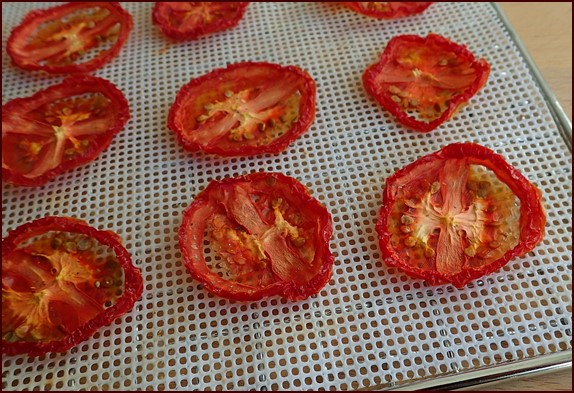
Photo: Sliced plum tomatoes after dehydrating on a silicone mesh sheet in a Cosori dehydrator.
Yield: 1 cup of sliced tomatoes (364 g) dehydrated on one Cosori dehydrator tray yields 1-cup of dried sliced tomatoes weighing 21 grams.
Dehydrating San Marzano Tomato Halves
Another great way of dehydrating tomatoes is to dry them in
halves. San Marzano tomatoes, with their oblong shape and meaty texture, are
perfect tomatoes for drying. Big Boy and Better Boy tomatoes are too fat to dry
in halves.
The benefit of drying tomatoes with the half-cut, is that all of the flavors in
the juices remain inside the tomatoes. To that, we add Italian seasonings.
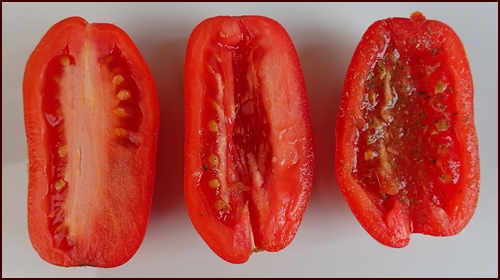
Photo: San Marzano tomatoes L-R: Cut in half, white pithy part removed, seasonings rubbed in.
Cut & Season
1. Cut tomatoes in half lengthwise.
2. Cut out the white pithy sections in the center between both ends of the tomatoes, being careful not to cut all the way through the tomatoes. If you leave the pithy section in there, it tends to dry hard and is not desirable.
3. Combine seasonings in a bowl and rub them between your fingers to mix the flavors well. Sprinkle onto tomatoes and push the seasoning into the juices with a spoon. Add two drops of red wine vinegar to each tomato after you add the dry seasonings.
Seasoning Mix for Tomatoes
The Italian seasoning mix below will make your kitchen smell wonderful while the tomatoes are drying.
Ingredients:
(Enough for 24 tomatoes)
- 1 tsp. salt
- 1 tsp. basil
- 1 tsp. oregano
- ½ tsp. garlic powder
- ¼ tsp. pepper
- 2 Tbsp. red wine vinegar (add last)
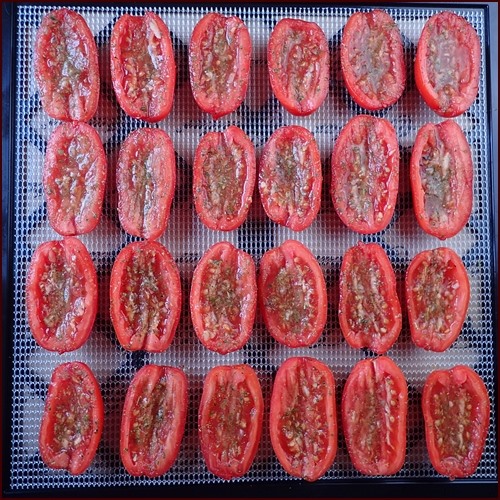
Photo: Twelve tomatoes, cut-side up, on Excalibur dehydrator tray.
Dehydrate
Dehydrate tomato halves at 135°F (57°C) for approx. 15 hours.
Dehydrating tomatoes in halves takes several hours longer than drying diced or sliced tomatoes, but the extra time is worth it. They’re delicious for snacking on, like chewy tomato jerky. The dried tomato halves can also be cut into smaller pieces for use in meals or trail mixes.
Times will vary depending on the thickness of the tomatoes and other factors like room humidity.
If noticeable moisture remains in the tomato halves after sixteen hours,
consider cutting them into smaller pieces, and continue drying them a few more hours.
Because the tomato halves are thicker than sliced tomatoes, you may only be able to use every other tray of your dehydrator.
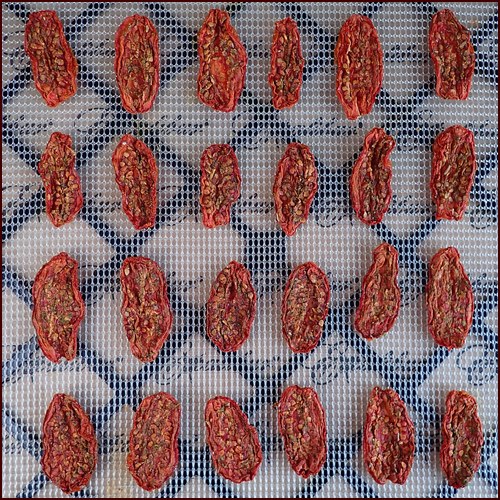
Photo: Dehydrated tomatoes on Excalibur dehydrator tray after fifteen hours. You could call it tomato jerky.
For snacking at home, you can leave a little moisture in the tomatoes, but store them in the refrigerator.
For trail use, allow the dried tomatoes to get almost crispy, so they keep well. Store in an air-tight container until ready to pack for a trip.
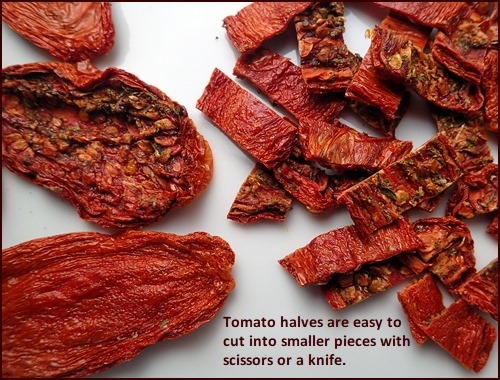
Photo: Dehydrated tomato halves on left; cut into smaller pieces with scissors on right.
Tuna & Pasta San Marzano Salad
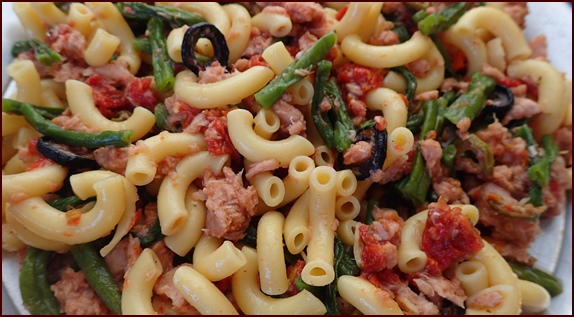
This cold-soak pasta salad recipe includes dehydrated San Marzano tomatoes.
Recipe: Tuna & Pasta San Marzano.
Dehydrating Quartered Cherry Tomatoes
Cherry tomatoes are round with diameters usually between ¾-inch and 1-inch. They are large enough to cut into quarters or slices.
For smaller cherry tomatoes, or for oblong-shaped grape tomatoes, cutting them into halves longwise works as well as quartering. Dehydrate half-cut cherry or grape tomatoes with the cut side facing up.
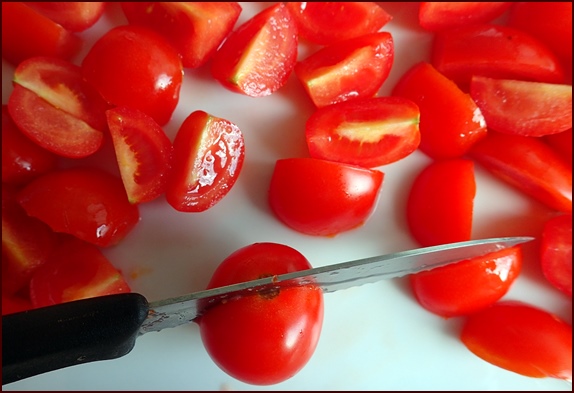
Photo: Cutting through a cherry tomato with a sharp, serrated knife.
Cut
1. Cut cherry tomato in half through the stem point.
2. Turn tomato 90° and cut down again.
Dehydrate
3. Arrange tomato quarters or halves in a single layer on mesh dehydrator sheets.
4. Dehydrate at 135°F (57°C) for 12+ hours. They will be pliable when dry and will bend, but not break.
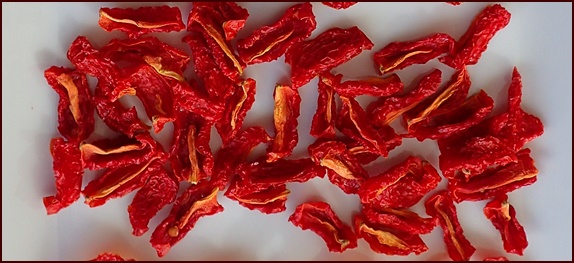
Photo: Dried cherry tomato quarters are a nice bite-size to use in backpacking meals.
Yield: 1½ cups of quartered cherry tomatoes (195 g) yields ⅓-cup of dried weighing 11 grams. There was room for twice this amount on a Cosori dehydrator tray.
Dehydrating Sliced Cherry Tomatoes
Dried cherry tomato slices are great for snacking on. Hit them lightly with seasoning salt before drying them to enhance the taste.
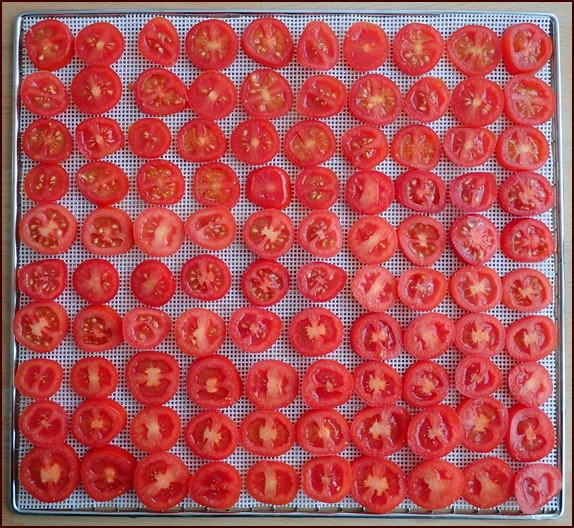
Photo: One Cosori dehydrator tray with silicone mesh sheet holding 25 cherry tomatoes cut into 100 slices.
Cut
1. Cut off the end where the tomato was attached to the stem.
2. Cut tomatoes crosswise into ¼-inch slices.
Dehydrate
3. Arrange tomato slices in a single layer on silicone mesh dehydrator sheets.
4. Shake a little seasoning salt on both sides of the tomato slices.
5. Dehydrate sliced cherry tomatoes at 135°F (57°C) for 12+ hours. They will be almost crispy when dry, cracking slightly when you bend them.
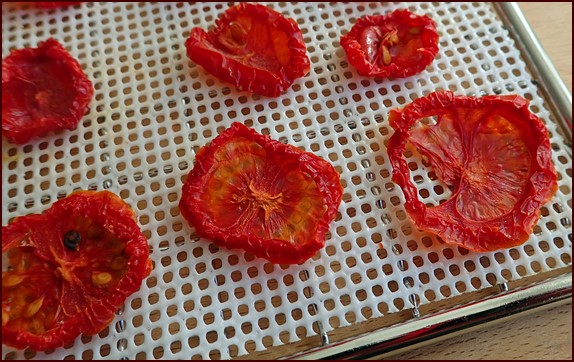
Yield: 2½ cups of sliced cherry tomatoes (359 g) dehydrated on one Cosori dehydrator tray yields ¾-cup of dried sliced cherry tomatoes weighing 22 grams.
Dehydrating Cooked Cherry Tomatoes
Dehydrating tomatoes cooked with herbs is a little like making tomato sauce leather, but you don’t run the cooked tomatoes through a blender. This gives more tomato texture to meals.
Cooked and dehydrated tomatoes can be used to give any backpacking meal an Italian flair, like this eggplant parmesan recipe.
Ingredients:
These quantities will fill one 12” x 10.6” nonstick silicone dehydrator tray.
- 500 g cherry tomatoes
- 3 cloves garlic
- ¼–½ tsp. salt
- 2 Tbsp. fresh chopped parsley*
- 2 Tbsp. fresh chopped oregano*
- 2 Tbsp. fresh chopped basil*
* Dried herbs may be used in place of fresh herbs. Start off with a teaspoon of each herb, or one tablespoon of Italian blend herbs. Adjust herbs and salt as desired while cooking.
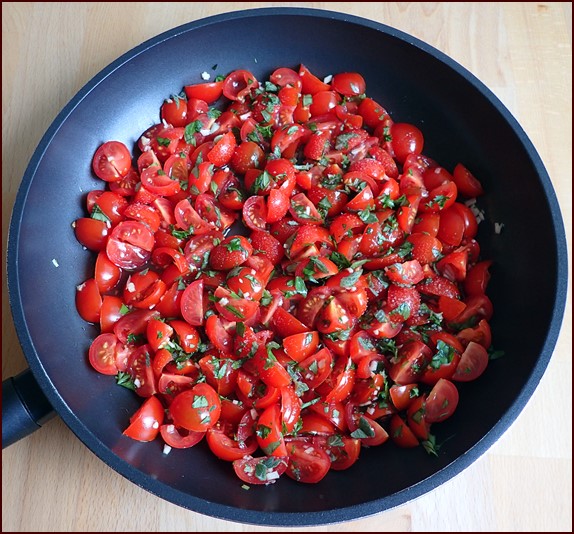
Photo: 500 grams of quartered cherry tomatoes with herbs before cooking.
Cook
1. Cut cherry tomatoes into quarters, dice garlic finely, and chop herbs into smaller pieces.
2. Add all ingredients to a cold pan, no oil required.
3. Turn heat to medium-high. When tomatoes start to bubble, reduce heat to medium and cook two more minutes.
4. After two minutes cooking at medium heat, reduce heat to low and simmer tomatoes for twenty minutes uncovered. Excess tomato juices will cook off during the simmering phase.
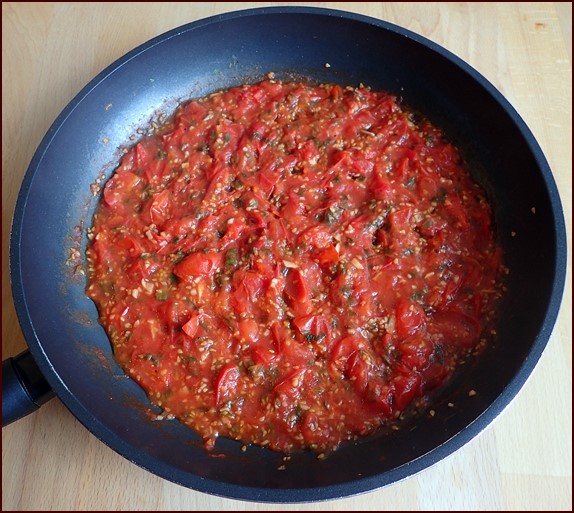
Photo: Cooked cherry tomatoes and herbs with excess juices reduced during simmering.
Dehydrate
1. Spread cooked tomatoes on a nonstick sheet or tray.
Photo: Cooked tomatoes on a 12” x 10.6” nonstick, silicone dehydrator tray with raised edges.
2. Dehydrate cooked tomatoes at 135°F (57°C) for 12+ hours.
3. When tomatoes are almost dry, after 10+ hours, flip the tray over onto a nonstick mesh sheet and peel away the silicone tray. This step ensures the tomatoes will be thoroughly dry on both sides.
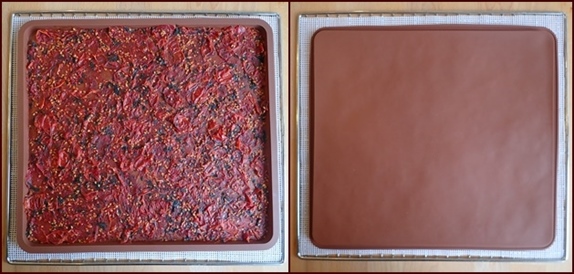
Photo: Flipping the almost dry tray of tomatoes over onto a mesh sheet.
4. Continue dehydrating tomatoes on mesh sheet until completely dry. The dried sheet of tomatoes will be slightly pliable, but easily torn into smaller pieces. There is a little more moisture retained when tomatoes are dried as a leather-like sheet compared to individual pieces. Moisture can be reduced a few more grams by tearing the sheet into pieces, spreading the pieces out on a tray, and drying for an additional hour or two.
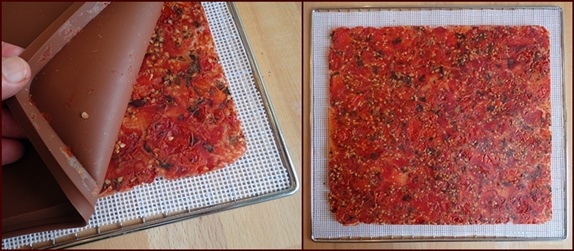
Photo: Peeling off the silicone tray to let the sheet of tomatoes finish drying on a mesh sheet.
Yield: 500 grams of cherry tomatoes will yield 1 cup dried tomatoes weighing 48 grams.
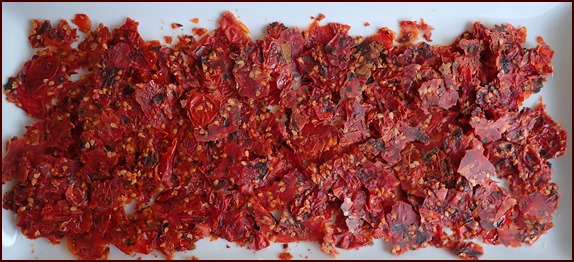
Photo: Dehydrated cooked tomatoes torn into pieces.
Dehydrating Tomato-Peach Salsa
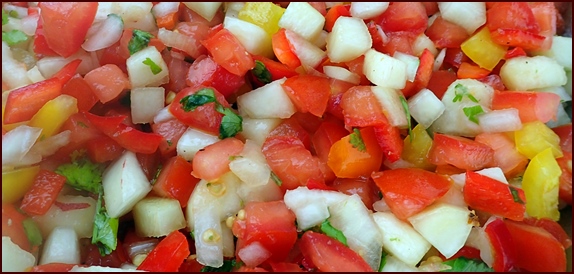
Photo: Diced tomatoes, bell peppers, onion, and peaches before drying. It’s delicious even if you don’t dehydrate it.
Another way of dehydrating tomatoes is to make salsa. Peach Salsa is rehydrated with cold water and can be enjoyed in tortilla wraps, with chips, or rehydrated as Peach Salsa Rice Salad.
Instructions & Recipes: Tomato-Peach Salsa
Storing Dehydrated Tomatoes
For short term storage, where you plan to use the dried tomatoes in backpacking meals that will be eaten within a month, you can store the tomatoes in Ziploc bags away from light, heat, and moisture.
If your trip is further out than a month, and for long term storage up to a year, store dehydrated tomatoes at home in airtight containers such as mason jars, away from light and heat. To ensure the longest shelf life of dried tomatoes, include oxygen absorbers, and/or seal the jars with a vacuum sealing accessory.
Dehydrated tomatoes tend to turn darker over time, so the best practice is to seal them well on the front end, and use them up within six months to a year. One way to use up dehydrated tomatoes is to add them to soups.
Recipes with Dehydrated Tomatoes
I include at least a pinch of dehydrated tomatoes in many of my backpacking meals. The recipes below are just a few examples, and you’ll find more on the Backpacking Chef Recipes Page.
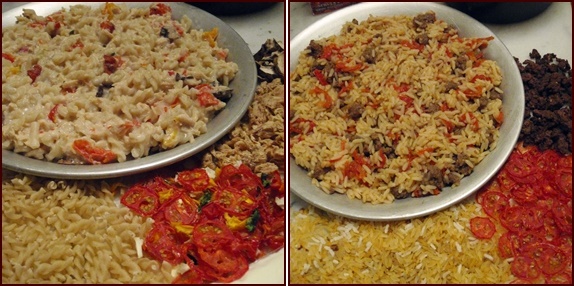
Recipes:
Spanish Rice with Beef & Tomatoes
The chili recipes shown below are dehydrated as whole meals using canned tomatoes.
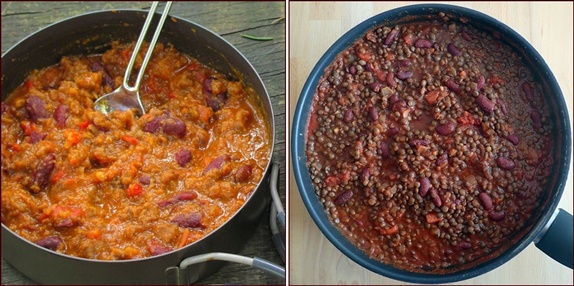
Recipes:
Cosori Dehydrator & Accessories
Shop Amazon for the Cosori dehydrator and accessories used for dehydrating tomatoes on this page. The silicone trays and silicone mesh sheets are flexible, truly nonstick, and are very easy to clean, although tomato juices may stain the mesh sheets a little due to the high acid content. Mesh sheets can be cut to size with scissors.

Left: Silicone Dehydrator Trays with Raised Edges, 11.8" x 10.8", 6-Pack
Middle: Cosori Dehydrator, Stainless Steel, 6-Trays
Right: Silicone Mesh Dehydrator Sheets, 14” x 14”, 12-Pack
Disclosure: As an Amazon Associate, Backpacking Chef earns from qualifying purchases. Thank you!
Explore More...

Photos: Recipes with tomato sauce leather: Beefy Mac & Cheese, Seafood Raminara, and Unstuffed Peppers.
How to make tomato sauce leather.
How to make tomato powder (from homemade tomato sauce)
How to Make and Dry Gazpacho (cold tomato soup)

Share this page with friends on social media.
Free E-book & Newsletter
Free with Trail Bytes subscription.
Dehydrating Food from A–Z

